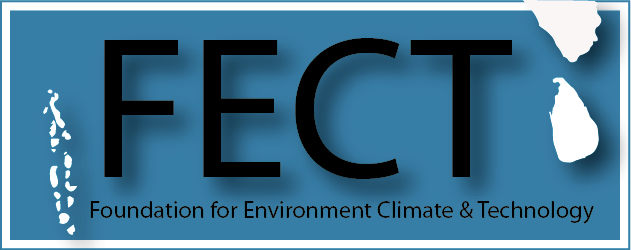Projects
This portal follows projects on drought that was executed by FECT with partners and which was supported by the US National Academy of Science and USAID. Some information on the drought is presented here with links for further information.
Climate Change and Drought Monitoring in Sri Lanka and Maldives
Contents
- project 1
- Project Duration: 2014-2017
- Project Duration: 2014-2017
- Investigators
- Project Briefs
- Summary of Recent Activities
- Objectives
Project Duration: 2014-2017
Summary : Scientists from the Foundation for Environment, Climate and Technology, Maldives National University, Columbia University are working with others in Universities, Water Supply and Meteorological Services to develop monitoring and predictive tools for drought risk and to address a riddle in climate change projections which predict a wetter climate although what has been experienced is sustained drying. This project is sponsored under the PEER program of the US National Academy of Sciences and USAID program in Sri Lanka and Maldives.
Project Link
Investigators
Principal Investigator: Dr.Lareef Zubair (FECT)
Co-Principal Investigator: Dr. Mizna Mohamed (MNU)
Project Briefs
Summary of Recent Activities
Goals:
To develop operational state of the art drought assessments using climate information, and to assess the climate change impacts on drought risk in Sri Lanka and the Maldives more reliably in the next decades.
Objectives
- Developing Drought hazard analysis and monitoring.
- Develop Assessment of near-term climate change.
- Undertake Drought and water scarcity projections for selected locations.
- Improve hydro-climatic advisories prepared by FECT for Dissemination and outreach including analysis of climate information by disaster experts.
- Capacity building through improving research infrastructure and training for research students.
Anticipated Development Outcomes:
- Gains from improved water and drought risk management and policy making.
- Demonstration in generation and use of climate information for disaster risk management.
- The provision of near-term climate change projections.
- Development of expertise in application of drought and near-term climate change information.
- Training on interpretation for key experts and undergraduates.
I. Climate Analysis and Tools-Progress
- Developed tools for rainfall monitoring from Satellite data.
- Compilation of climate predictions.
- Ongoing weekly & monthly dissemination of climate reports.
- Developed tools for drought monitoring.
- Estimating water scarcity in Greater Male’ Maldives.
- Data analysis on disasters in Sri Lanka.
- Seasonal climate reports for Sri Lanka.
- Pinga Oya floods & environment assessment.
III. Scientific Conferences & Publications
- Conference contribution.
- Book publications.
- Journal publications.
- Pinga Oya symposium proceedings.
IV. Dissemination and Training
- Training of junior scientists.
- Contribution to University education.
- Web & social media dissemination of products.
- Workshops, Media outreach
Can drought and flood hazards be skillfully and robustly assessed at fine spatial resolution in Maldives and Sri Lanka?
Principal Investigator: Prof.P.Wickramagamage (FECT)
Co-Principal Investigators: Dr.Lareef Zubair (FECT)
Dr.Zahid- Maldivian meteorological service (MMS)
Project Goals
To develop operational drought, flood and landslide hazard assessments using climate, terrestrial and societal information and to assess drought, flood and landslide risk more reliably in Sri Lanka and the Maldives.
Objectives
- Engage with Key stakeholders for guidance and effectiveness.
- Develop Data resources.
- Develop Historical hazard indices for Sri Lanka and the Maldives.
- Develop indices to Assess multiple methodologies for hazard estimation using available data.
- Assess vulnerability and resilience for the different hazards.
- Assess predictions from satellite and model predictions to cast hazards in advance.
- Develop a multivariate hazard estimation methodology for prediction.
- Diagnose physical underpinnings of differences of multivariate indices to improve skills.
- Capacity building through improving research infrastructure and training for students.
Development Outcomes:
- Improved risk management and policymaking.
- Use of advanced climate information.
- Generation & application of near-term climate change information.
- Development of expertise in the application of near-term climate change information.
- Training of undergraduates, researchers, disaster managers.
What has been done?
- Climate Analysis and Tools-Progress
- Compilation of climate predictions.
- Ongoing weekly & monthly dissemination of climate reports.
- Developed tools for drought monitoring
- Drought Portals for Sri Lanka and the Maldives, which are comprehensive resources on droughts were launched.
- Dissemination and Training
- Conference contribution.
- Training of junior scientists.
- Conducting University lectures at UoP Sri Lanka & MNU Maldives.
- Web & social media dissemination of products.
- Workshops, Media outreach.
- Communication strategy for the Maldives.
- III. Case Studies
Through case studies and the monitoring systems, the team has undertaken a detailed study of information to support decision making for
- Water Budgeting for each Islands in the Maldives
- Flood Prediction without significant observation
- Drought Monitoring based on satellite data
- Air Quality impacts in an agricultural area affected by Industry
- Landslides and cyclone in Sri Lanka

